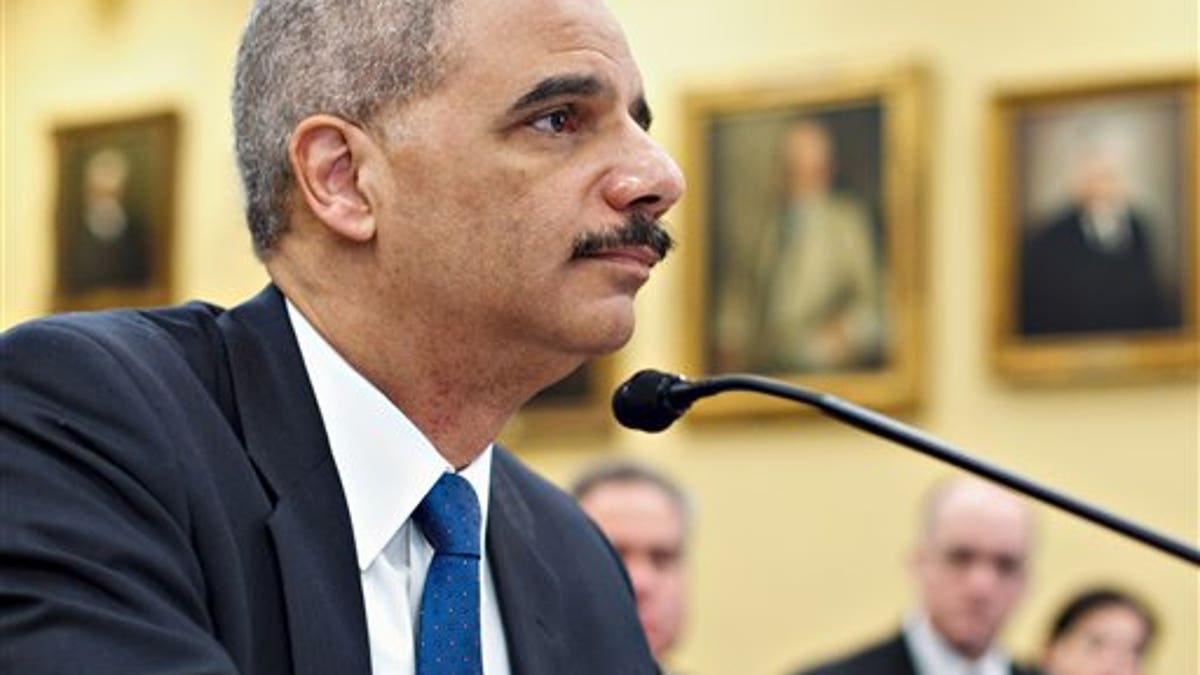
Feb. 28: Attorney General Eric Holder testifies on Capitol Hill in Washington before a House Appropriations subcommittee hearing. (AP)
WASHINGTON – In sworn testimony Tuesday, Attorney General Eric Holder defended the Obama administration's controversial contraception mandate, and vowed that the federal government's legion of lawyers will follow suit.
"To the extent that that action is challenged in court, I would expect that the Justice Department would defend what I guess is in place -- would be that compromise," Holder told lawmakers on a House Appropriations subcommittee.
The "compromise" Holder cited was announced by President Obama on Feb. 10, after a firestorm of criticism from the Catholic Church and other religious groups prompted the administration to revise an earlier rule, promulgated in January by the Department of Health and Human Services (HHS).
Under these rules, all employers must provide female contraception as part of their health care plans, with the cost of the contraception coverage to be incurred by the insurer if a given employer -- such as a Catholic-affiliated charity, hospital, or school -- objects on religious grounds. The U.S. Conference of Catholic Bishops has rejected the compromise, saying it still forces Catholic institutions to violate their conscience by providing -- even at zero cost -- a benefit to their employees that violates church doctrine. As well, many Catholic institutions self-insure.
In testimony before the House Ways and Means Committee, HHS Secretary Kathleen Sebelius appeared at one point to suggest that some further accommodation might be in store for those religious organizations that provide their own insurance.
"We will have a provision dealing with self-insured plans, who work through third-party administrators, to make sure that anyone with a religious exemption will not provide or pay for or refer people to contraception services, and maintain their religious freedom," she testified.
But that statement did not apply to the Catholic-affiliated hospitals, charities and schools that have raised the greatest hue and cry over the HHS mandate -- precisely because they do not presently qualify for the "religious exemption" that Sebelius mentioned.
Some lawmakers consulted an eight-page memorandum on the topic freshly prepared by the Congressional Research Service. Dated Feb. 24, the memo cited three federal laws -- the Employer Retirement Income Security Act (ERISA), the Public Health Service Act (PHSA), and the Internal Revenue Code (IRC) -- that could trigger "enforcement mechanisms" against those employers who fail to comply with the HHS rule.
The memo stated that under PHSA and IRS codes, non-compliant employers could face fines of $100 per day for each employee not receiving the mandated coverage, as well as an excise tax of the same amount and frequency. Religious leaders opposed to the HHS mandate have said the financial penalties would likely prove ruinous to their institutions.
"The Diocese of Columbus has many more than just 100 employees, all of whom, when they got hired, knew what health care they were getting," Rep. Pat Tiberi, R-Ohio, told Sebelius. "And the bishop and I talked about the president so clearly saying, ‘If you like (the health plan) you have, you can keep it.' He said that over and over, many times.
"My question to you is: If they refuse the mandate, refuse to violate their First Amendment (rights), refuse to violate their religious beliefs and refuse to pay the fine, what consequences, as an employer, will Bishop Cambell face?"
"I have no idea," Sebelius said at the end of a lengthy answer that recited the basic chronology of the controversy. "The hypothetical -- I mean, I can -- if you want to submit that in writing, I'll get you an answer in writing."
Also weighing in on the controversy Tuesday was Secretary of State Hillary Clinton. In testimony before a Senate Appropriations subcommittee, the nation's top diplomat encouraged Catholics opposed to birth control on doctrinal grounds to embrace it for practical reasons.
"I know that it is a very controversial issue," Clinton told lawmakers, "but numerous studies have shown that the incidence of abortion decreases when women have access to contraception."
Catholics are also deeply opposed to abortion.





















